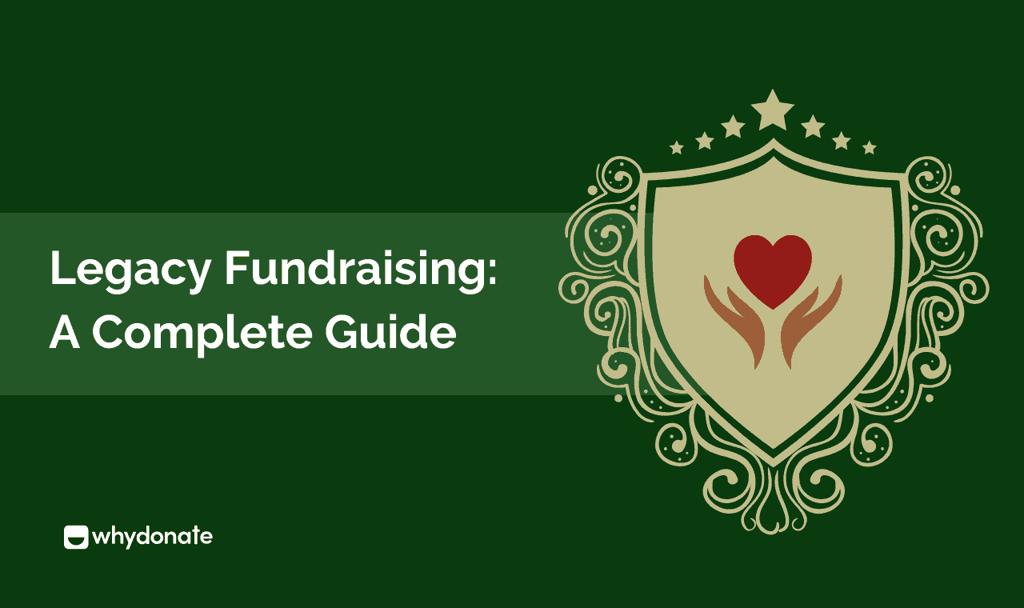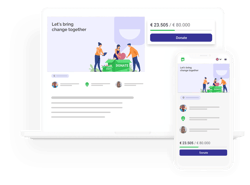Non-profit organizations have a positive impact on society. Not only do they change society, but most importantly, they improve the lives of the people in need. This positive impact leaves a valuable imprint in the hearts and minds of people who have benefited. Because of the valuable help of non-profit organizations, these people willing to do something for the organization often give their valuable assets to them, like a legacy gift or donation to a non-profit organization in their will or estate plan.
Start a fundraiser to honour someone’s legacy and support future generations!
If you wish to know more about this excellent way of showing gratitude, read this writing until the end. In this blog, we have covered all the essential things that you must know about legacy fundraising. From its benefits to building a successful legacy fundraising strategy, we have protected it all and more.
Table of Contents
What Is Legacy Fundraising?
Legacy fundraising is a unique way of showing your undying support to an organization, mainly non-profit. In legacy fundraising, the donors donate their valuable assets, like a legacy gift or donation to a non-profit organization in their will or estate plan. It is a way for individuals to commit to a cause they are passionate about and to donate a part of their wealth, whether money, property, or other valuables.
These gifts have the potential to make a lasting difference and can contribute to the sustainability and mission of a non-profit organization. The best part about it is that when someone gives a legacy gift, that gift is kept with the organization even after their passing. Legacy charity fundraising is a way for individuals to make a lasting impact and leave a positive mark even after their lifetime. This type of donation is considered the most significant donation any human being could give.
What Are The Benefits Of Legacy Fundraising?

Since legacy charity fundraising is done even after the passing of an individual, it holds significant meaning and hence provides several benefits. Let us have a look at them:
1. Long-Term Stability
Legacy fundraising is an effective strategy that aims to provide stability over the long term for non-profit organizations by developing relationships with people who are willing to leave the organization a legacy in the form of a will or estate plans. These gifts can be an ongoing and reliable source of income, ensuring the stability of your organization’s finances far into the future. Incorporating a well-defined legacy fundraising strategy is crucial to capitalize on this opportunity.
2. Consistent Revenue Stream
Legacy charity fundraising provides a consistent source of income for non-profits by inviting donors to take on long-term commitments. Through fostering relationships with supporters with whom they are willing to make an inheritance, charities can count on a stable and reliable source of income, which allows the organization to design and carry out its plans efficiently. Developing a robust charity legacy fundraising program is key to establishing this sustainable revenue stream.
3. Recognition And Donor Stewardship
Legacy fundraising stresses the importance of honoring and recognizing donors who decide to make a lasting impression on the organization. Through donor stewardship, charities acknowledge their gratitude, send information on legacy donations, and ensure they are in constant communication, building solid relationships with donors and ensuring their generosity is recognized and appreciated. Implementing a comprehensive donor stewardship plan is essential to maintaining strong connections with legacy donors.
4. Donor Engagement
Legacy’s fundraising message engages the donors by encouraging them to be integral to a meaningful legacy that aligns their values with the organization’s purpose. It promotes open communications and personal connections and allows donors to participate actively, creating an identity and involvement that lasts beyond their lifespan. Engaging donors through targeted legacy fundraising campaigns and personalized communication is vital to fostering donor engagement.
5. Enhanced Program And Service
Legacy charity fundraising enables non-profits to expand their services and programs by giving them a solid financial foundation for expansion and growth in the future. With the safety of legacy donations, non-profits can invest in innovative initiatives, develop new solutions, and increase the quality and effectiveness of their services, ultimately benefiting the communities they serve. Developing a robust legacy fundraising strategy is essential to ensure the growth and impact of programs and services.
Start a fundraiser and grow your community impact with legacy support!
How To Build A Successful Legacy Fundraising Program?

Legacy fundraising strategies are designed to ensure that a non-profit’s sustainable financial health and mission can continue soon. Here are the most commonly used methods of fundraising that have been used for decades:
1. Plans For Giving
Organizations can create plans to help inform donors about the advantages of leaving a lasting contribution and provide them with the required tools and information to make it happen. This includes tools like brochures, workshops, seminars, and workshops regarding estate planning and wills. Incorporating a well-structured plan for giving is crucial for a successful legacy fundraising program.
2. Donor Cultivation
Creating solid relations with donors is essential in developing a legacy fundraising strategy. Non-profits can participate in activities to cultivate donors to build trust, connections, and loyalty. This can include personal communications, donor recognition events, and periodic updates about the impact of legacy donations. Cultivating strong relationships with donors is key to successful charity legacy fundraising.
3. Legacy Societies
Many non-profits set up foundation societies and clubs to acknowledge and honor those who have left a legacy for the charity in their wills. Participation in these legacy fundraising activities usually offers perks, including exclusive occasions, networking opportunities, and public acknowledgment. Establishing legacy societies is an effective way to engage and recognize legacy donors.
4. Professional Advisors’ Engagement
Non-profits can seek independent professional advice, like estate lawyers and financial planners, to ensure that the options for legacy giving are offered to potential donors. Connections to these professionals can be the basis for referrals and increase awareness of the organization’s legacy giving options. Engaging professional advisors is critical to a successful legacy fundraising program and helps in regulatory and legal considerations.
5. Sharing Stories
Storytelling or inspiring stories and showing the value of charity legacy fundraising in people’s lives can be an effective strategy to entice prospective donors. Non-profits can show how legacy gifts have impacted the lives of the beneficiaries and contributed to the organization’s cause. Incorporating storytelling into legacy fundraising campaigns helps create emotional connections and inspire potential donors.
6. Marketing And Communication
Effective communication and legacy marketing campaigns play an essential part in legacy fundraising. Non-profits can use different channels, including newsletters, social media, websites, and direct mail, to inform donors about the opportunities for legacy giving and to encourage donors to get involved. Implementing a comprehensive marketing and communication strategy is crucial to reaching and engaging potential legacy donors.
7. Collaborating with Financial Institutions
Non-profits can collaborate with banks, wealth managers, and financial institutions to promote legacy donations as part of long-term financial planning. These institutions can help identify potential legacy donors and facilitate smooth transactions and legal compliance. Providing informational brochures and hosting joint educational seminars can also foster donor trust and confidence in legacy funding.
8. Creating Online Pledge Forms
In today’s digital era, providing easy-to-use online pledge forms simplifies the process for potential donors to express their legacy fundraising intentions. These forms can include essential information on estate planning, types of legacy gifts, and legal guidance. Ensuring data security, clarity, and mobile-friendliness is key to maximizing participation. Embedding these forms on your website and promoting them as part of your charity fundraising strategy helps increase reach and engagement.
FAQs (Frequently Asked Questions)
How to promote legacy giving?
Promote legacy giving by creating awareness through effective marketing campaigns, engaging with professional advisors, sharing inspiring stories, and cultivating relationships with donors through personalized communication and recognition events. Promoting legacy giving is a vital aspect of a successful legacy fundraising strategy.
What is a legacy fund in a will?
A legacy fund in a will refers to a designated portion of an individual’s estate or assets allocated to a specific cause or organization as a charitable contribution after their passing. Including a discussion on legacy fundraisers will provide clarity and understanding to potential legacy donors.
What are legacy donations?
Legacy donations are charitable contributions individuals make through their wills or estate plans. They leave a lasting impact by supporting non-profit organizations or causes that align with their values and beliefs. Highlighting the concept of legacy donations emphasizes the significance of this form of giving.
Does legacy only mean money?
No, legacy does not only mean money. While financial contributions are common in legacy giving, they can also involve non-monetary donations such as property, assets, or other valuable resources that benefit a non-profit organization or cause. Emphasizing that legacy can go beyond financial contributions provides a broader perspective on legacy fundraising.
What is the purpose of a legacy?
The purpose of a legacy is to create a lasting impact and positively influence future generations. It allows individuals to support causes they care about, ensure their values endure, and make a meaningful difference even after they are gone. Discussing the purpose of a legacy highlights the significance of legacy fundraising in creating a lasting legacy for donors.
How can a non-profit start a heritage legacy fund?
A non-profit can start a heritage legacy fund by developing estate planning materials, engaging legal experts, and promoting legacy giving through targeted marketing and personal outreach.
What are the best ways to market legacy fundraising?
The best ways to market legacy fundraising include storytelling, hosting educational events, direct mail campaigns, social media promotions, and building relationships with professional advisors.
Start a fundraiser and turn your story into a legacy of hope!
Wrapping Up!
In conclusion, legacy charity fundraising holds immense potential for non-profit organizations seeking sustainable financial health and the ability to continue their mission well into the future. By understanding the benefits of charity legacy fundraising and implementing a successful strategy, non-profits can unlock opportunities and secure the support they need to make a lasting impact.
Incorporating a well-defined legacy fundraising strategy, engaging with donors and professional advisors, sharing inspiring stories, and promoting legacy giving are essential components of a successful legacy fundraising program. Happy Fundraising!


















